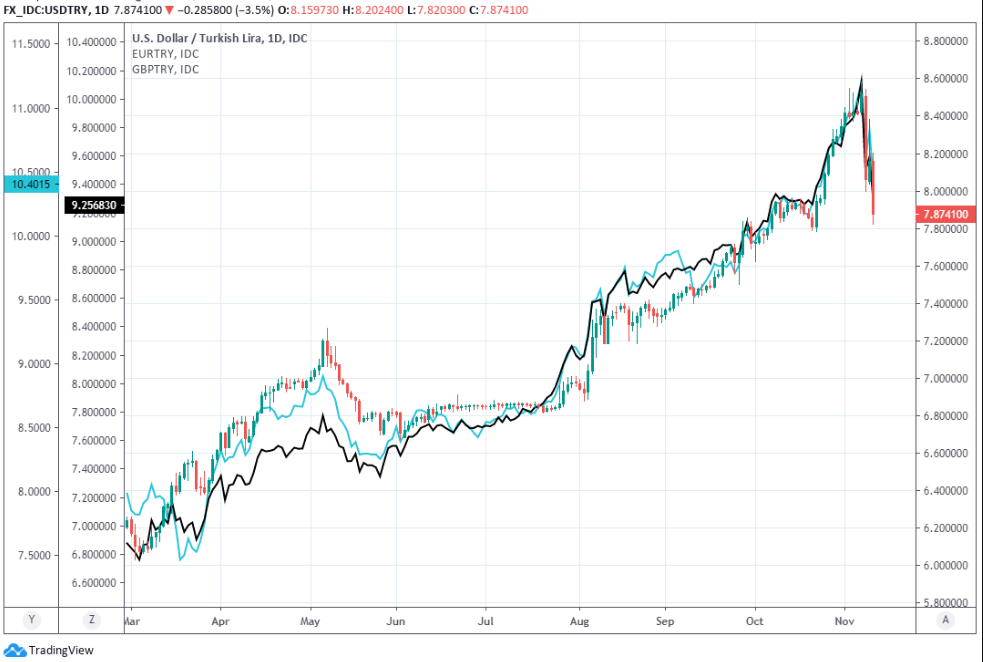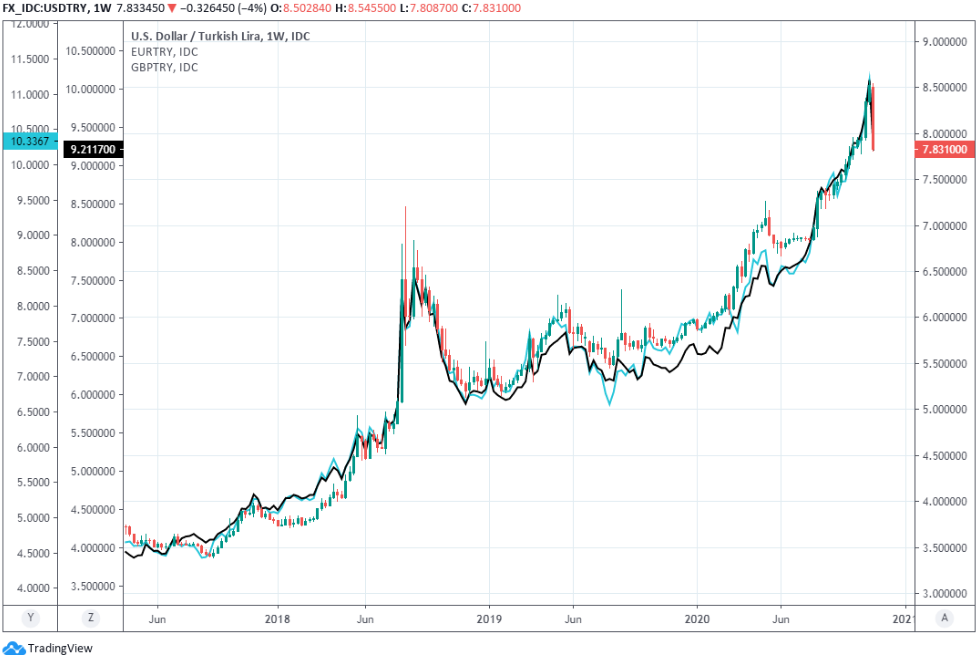Turkish Lira Resurgent as Market Cheers Hints of Reform, but Does It Suffer from Selective Hearing?
- Written by: James Skinner
-TRY eyes biggest weekly gain since 2018 on hopes of policy reform.
- As personel changes, Erdogan's 'bitter pill' remarks enthuse market.
- But other rhetoric suggests a risk that market has selective hearing.
- Outlook hinged on Nov 19 CBRT decision & interest rate prospects.
Image © Adobe Stock
- GBP/TRY spot rate at time of writing: 10.33
- Bank transfer rate (indicative guide): 9.78-10.05
- FX specialist providers (indicative guide): 10.18-20.24
- More information on FX specialist rates here
Turkey's troubled Lira was on course for its best week since the middle of 2018 on Wednesday after remarks from President Recep Tayyip Erdogan seemingly suggested that large interest rate hikes are on the way, although other recent rhetoric indicates that only that investors may just have selective hearing.
Investors bought the Lira hand over fist on Wednesday, enabling it to build on Monday's gains over the Dollar, Euro and Pound after the Turkish currency took a breather from its rally in the prior the Tuesday session.
USD/TRY, EUR/TRY and GBP/TRY were on course for their largest one-week falls since August 2018 and the height of that year's currency currency depreciation, which has been a near constant feature of life in Turkish foreign exchange markets for at least the last decade.
Lira gains were encouraged Wednesday by an adddress from President Recep Tayyip Erdogan in which he reportedly said that he would be willing to "make sacrifices and swallow a bitter pill if needed," before later reiterating his controversial and unorthodox contention that lower interest rates are the best way to reduce rising inflation.
“We will show the entire world that Turkey is one of the top countries that will yield the highest and the most secure income when invested in. Within this framework, our economic leadership will work closely with domestic and international investors," President Erdoğan said Wednesday.
Above: USD/TRY, EUR/TRY (black) and GBP/TRY (blue) shown at daily intervals.
This follows the Sunday resignation of Finance Minister Berat Albayrak, who's since been replaced by former development minister Lufti Elvan, and the Saturday firing of Governor Murat Uysal from the Central Bank of the Republic of Turkey (CBRT) who's post is now filled by former finance minister Naci Agbal.
"The announcement today was very likely the result of Erdogan realising that the end of the line had been reached. No other policy tool but central bank credibility was going to cut it. In our view, today’s announcement was his way of dodging the IMF bullet," says Tatha Ghose, an analyst at Commerzbank. "It is likely that Erdogan realises that the bitter pill would have to remain in place for some time – this is not about accepting a rate hike at one CBT meeting – higher rates would have to stay in place until balance sheets get a chance to repair and CBT’s FX reserves recover to some extent at least. He may miscalculate for sure, but at this point we give him benefit of doubt."
The former minister and central bank governor were both lynchpins of the unorthodox policy that has seen Turkish interest rates cut by more than half in the last two years and the Lira currency fall by -129% and at an annualised pace of -45.15% against the Dollar since the beginning of 2018. EUR/TRY has also risen by 129% and at an annualised pace of some an annualised pace of some +45% while GBP/TRY rose 124% and at an annualised pace of 43.59%.
An unorthodox policy of lowering interest rates in order to reduce inflation has seen 'real interest rates' become negative in Turkey, driving a rout in Lira exchange rates that has prompted interventions by the CBRT and led the central bank to burn through the bulk if-not all of its foreign exchange reserves. The CBRT has since tapped other central banks and governments for FX swaps, which provide foreign currencies in an off-market manner for a specified period and in exchange for an agreed interest rate differential. But neither the foreign exchange reserves, the swap lines nor any other interventions have been able to prevent the Turkish currency from unravelling.
Above: USD/TRY, EUR/TRY (black) and GBP/TRY (blue) shown at weekly intervals.
"We expect USDTRY to trade within a wide range of 7.90-8.50 in the very short run and potentially all the way to the time of the central bank’s rate decision next week (19 November). We then see two-way risk to USDTRY coming from this rate decision," says Nimrod Mevorach, a strategist at Credit Suisse. "The sizable lira rally so far this week implies that investors already expect a large rate hike in the entirety of the central bank’s policy interest rate structure at the central bank’s meeting next week – perhaps in a move that lifts the upper end of the interest rate corridor by 400bps-500bps (to a new level of around 19%-20%). If this is correct, investors would consider a decision by the central bank next week to raise rates much less sharply (for example by 200bps) insufficient and an argument against the idea that the recent change of personnel marks a policy shift. In such a scenario we think USDTRY would rebound by about 2%-3% initially – i.e. to around the 8.35 area from close of Tuesday’s levels."
Investors and the foreign exchange market very clearly took Wednesday's remarks from Erdogan and the weekend's personel changes to mean that a return to more orthodox policy is in the pipeline, with some media billing it as a u-turn that could be described by the less charitable or constructive observers as an outright capitulation.
This is barely a day after President Erdogan used a moment of national celebration to rail against the capitulations of Ottoman Turkish leaders, where he effectively cast the market contentious interest rate policy as a continuation of the Turkish war of independence.
This earlier nationalistic rhetoric was spoken after the weekend's personel changes but before Wednesday's address and at least appears to rule out the policy u-turn on inflation and interest rates that investors and the foreign exchange market have already taken to the bank.
“We are now waging a struggle of historic importance against those who seek to yet again condemn Turkey to modern-day capitulations through the shackles of interest rates, exchange rates and inflation," President Erdogan said on Tuesday, as the republic celebrated the memory of Ghazi Mustafa Kemal Atatürk, its founder who led a Turkish war of independence against the allied victors of the first world war. "Never compromising the rules of free market economy, never desisting from our determination to maintain growth by the hand of private sector and never forgetting the fact that money has no nationality or borders, we continue to work very hard.”






